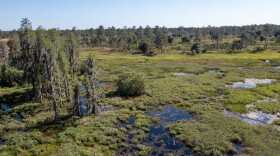-
Team Ocean plans to raise awareness around pollution and heat through social media and at popular events, like the World Cup next year and the 2028 Olympic Games.
-
Out of 10 cities analyzed in Florida, Tampa's winter is warming the fastest.
-
Carbon credit programs have come under scientific scrutiny for overstating how much they help the climate.
-
Barely one-fifth of the staghorn corals survived. And elkhorn corals weren't even found at two of the five reefs surveyed. These are the biggest, most visible corals found in the world's third-largest reef.
-
Earth breached a key temperature recently. A climate scientist explains how this warming and consequent weather patterns could impact the 2024 hurricane season, which begins June 1.
-
As sea levels rise, saltwater intrusion and heat will create challenges for certain plants and trees to survive in the coming years, and Florida is on the front lines.
-
Acidification is “not terribly bad right now” in the Gulf, but due to climate change, the water will likely become more acidic in the future. This threatens the estimated $2.04 trillion annual marine economy.
-
DeSantis wants $270 million to protect Florida's waterways, but environmentalists say more is neededThe money — if approved by state lawmakers — would pay for things like water treatment plants, shoreline stabilization projects and seawalls.
-
A Hillsborough resident who experienced climate change had questions. Hear a climatologist's answersDe'Andre Long of Riverview asks Florida climatologist David Zierden some questions about how weather is affected by infrastructure, industries and other human activities.
-
Among the findings: Scientists are confident in saying that there will be more frequent storms in the highest intensity categories of 4 and 5.
-
Scientists say humans must keep global temperatures from increasing more than 1.5 degrees Celsius. The World Meteorological Organization warns that number is looming.
-
New temperature averages reflect the general warming trend that we've seen both in the U.S. and globally in the past several or more decades. Large portions of the country are actually a little wetter, which is also consistent with climate change.
Play Live Radio
Next Up:
0:00
0:00
Available On Air Stations












